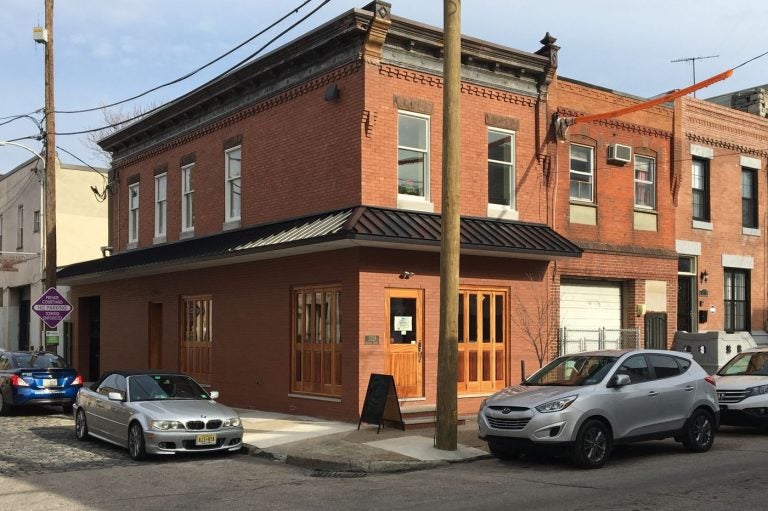A grocery opens in Point Breeze to bring affordable food to supermarket desert
A corner store on a mission, Rowhouse Grocery in Point Breeze is a posh yet accessible oasis in a supermarket desert.

Rowhouse Grocery in Point Breeze (Alfred Lubrano/Philadelphia Inquirer)
A corner store on a mission, Rowhouse Grocery in Point Breeze is a posh yet accessible oasis in a supermarket desert.
In too many low-income areas of Philadelphia where large food stores don’t exist, residents have to think of tomatoes and apples as exotic fruit, as hard to find as guavas, rambutans, and whatever else gets piled into bins at luxe spots like Whole Foods.
But at Rowhouse, “the general goal was to have a store that provides fresh produce at affordable prices,” said Jen Holman, one of the four co-owners of the store, which opened in November. No one can say for certain, but it might be a one-of-a-kind spot in the city.
Most corner stores have few, if any, fruits and vegetables because they spoil too quickly and the cost of the waste is difficult for a small business to carry. But at Rowhouse, two professional cooks create dishes with the produce before it spoils, so Rowhouse can maintain a fresh inventory.
The owners also plan to do catering, so they can reach outside the local community for income, thus subsidizing the items in the store, and keeping prices affordable.
A revolution
Rowhouse is a kind of revolution in a sedate setting — a different way to feed people. It’s also a new way to attack poverty, and to offer healthy options to people who don’t normally see much in typical corner stores beyond salt- and fat-filled food choices that can lead to lifetimes of obesity, diabetes, and heart disease, according to health professionals who study low-income areas.
The four co-owners know one another from living in the neighborhood. Each left a long-term position in the food industry to rent the Rowhouse from owners who’d recently renovated the building after it had sat dormant for about 30 years. “We felt we had skills to use in a way that could help lots of people,” Holman said. Two of the group ran an outdoor market in the summer and fall of 2017 and were encouraged by the “curious food traffic.”
In Point Breeze, in South Philadelphia, one out of every four residents lives in poverty, according to U.S. census statistics. But the neighborhood is also gentrifying: Median household incomes rose from $29,342 in 2010 to $37,879 in 2017, federal figures show.
So, along with low-income residents, Rowhouse’s customers are also middle- and upper-class neighbors. The store, then, pulls double duty, attracting folks who have a taste for Rowhouse specialty sandwiches such as turkey and bacon jam, as well as those hoping not to pay a king’s ransom for a half-gallon of milk, as is the case in many corner stores.
“We felt we had the skills to use in a way to help everybody,” said Holman, 45, who once taught nutrition to low-income children and still works at the South Philadelphia Taproom. “Ultimately, we’re trying to show kids here how to source food other than two dozen chicken wings from the local Chinese takeout store.”
Allie Hauptman, 31, a Rowhouse co-owner, agreed.
“I know my neighbors,” said Hauptman, who once ran the kitchen at Friends School Haverford. “And it would be a betrayal to make a store here with high prices.”
The food in the well-appointed grocery — featuring hardwood floors and artfully exposed bricks and beams — is so well-priced that some customers have actually complained that they pay too little, said Holman, laughing.
It’s not easy
The pricing is no accident. The owners did research that showed the nearest supermarket is about a mile away. They also found that there were 3,234 households receiving food stamps (SNAP benefits) within a half-mile radius as of 2015. The goal, Holman explained, was to provide food that could be afforded by a three-person household receiving $382 in monthly SNAP benefits.
“We don’t want to charge prices some in the neighborhood can afford but others can’t,” said co-owner Susan Holland, 32. “We want to bring in revenue to operate, but be conscious of what others can afford.
“It’s not easy. And I understand why it hasn’t been done before.”
Informing the co-owners’ desire to create a corner store with equal parts panache and public spirit are well-developed social consciences.
“It’s great to hand people food and drinks for money as a waitress,” Holman said. “I love the restaurant industry. But I need to do more for my community than just serving beer to young professionals on a Friday night.”
For Hauptman, Rowhouse reflects personal values generated from attending a Quaker school and learning from Judaism that “giving back is a big part of life.”
Relatively new to the area, Rowhouse customer Ava Burns, 31, a nurse, said she can’t get over how “reasonable” the prices are, and praised the look of the place: “Very appealing, homey, and comfortable.”
For long-time resident Lewis Richmond, 69, a retired Temple University housekeeper on a fixed income, the store seems a bit too fancy to go into, but he plans to maybe buy milk there sometime soon. “I hear they keep prices low,” he said.
If the Rowhouse group can get enough catering gigs, the store will catch on and thrive, the co-owners believe. They have plans to make the commodious second floor available to the neighborhood for classes on starting a business, or learning tenants’ rights.
And while they’re aware the neighborhood is changing, with richer people moving in, Hauptman said one Rowhouse principle soars above all others: “We want to make sure that this store will always be affordable for the people who’ve always lived here.”
 WHYY is one of 22 news organizations producing Broke in Philly, a collaborative reporting project on solutions to poverty and the city’s push toward economic justice. See all of our reporting at brokeinphilly.org.
WHYY is one of 22 news organizations producing Broke in Philly, a collaborative reporting project on solutions to poverty and the city’s push toward economic justice. See all of our reporting at brokeinphilly.org.
WHYY is your source for fact-based, in-depth journalism and information. As a nonprofit organization, we rely on financial support from readers like you. Please give today.




